De Engelse schrijver Jonathan Coe werd geboren op 19 augustus 1961 in Birmingham. Zie ook alle tags voor Jonathan Coe op dit blog.
Uit:Number 11
“The round tower soared up, black and glistening, against the slate grey of a late-October sky. As Rachel and her brother walked towards it across the moor, from the east, it was framed by two leafless, skeletal ash trees. It was the hour before dusk on a windless afternoon. When they reached the trees, they would be able to rest on the bench that stood between them, and look back towards Beverley in the near distance, the neat clusters of houses and, rising up in the midst of them, the monumental, answering greyish-cream towers of the Minster.
Nicholas flopped down on the bench. Rachel – then only six years old, eight years his junior – did not join him: she was impatient to run up towards the black tower, to get close to it. She left her brother to his rest and scurried onwards, squelching her way through the cow-trodden mud that surrounded the foot of the tower until she was right up against it, and could lay her hands upon the gleaming black brickwork. The flat of both hands upon the tower, she looked upwards and could not comprehend the size and scale of it, the perfect, lucid curve as it arched itself, like a sway back, against a threatening sky through which a pair of rooks were now skimming, cawing and circling endlessly.
‘What did it use to be?’ she asked.
Nicholas had joined her now. He shrugged. ‘Dunno. Some kind of windmill, maybe.’
‘Do you think we could get inside?’
‘It’s all bricked up.’
There was a circular wooden bench running all around the base of the tower, and when Nicholas sat there, Rachel sat beside him and stared up into his pale, unresponsive blue eyes, which for all their coldness only made her feel how lucky she was, how blessed, to have an older brother like this, so handsome and confident. She hoped that one day her hair would be as blonde as his, her mouth as shapely, her skin as downy and clear. She nestled against his shoulder, as close as she dared. She didn’t want to be a drag upon him, didn’t want him to become too aware that, in this strange and unfamiliar town, he was the only thing that made her feel safe.
‘You cold or something?’ he asked, looking down at her.
‘A bit.’ She inched away slightly. ‘Will it be warm where they are, d’you think?’
‘Course it will. There’d be no point going on holiday somewhere where it’s cold, would there?’
‘I wish they’d taken us with them,’ said Rachel feelingly.
‘Well, they didn’t. So that’s that.’

Jonathan Coe (Birmingham, 19 augustus 1961)
De Amerikaanse dichter Li-Young Lee werd geboren op 19 augustus 1957 in Jakarta, Indonesië. Zie ook alle tags voor Li-Young Lee op dit blog.
Out Of Hiding
Someone said my name in the garden,
while I grew smaller
in the spreading shadow of the peonies,
grew larger by my absence to another,
grew older among the ants, ancient
under the opening heads of the flowers,
new to myself, and stranger.
When I heard my name again, it sounded far,
like the name of the child next door,
or a favorite cousin visiting for the summer,
while the quiet seemed my true name,
a near and inaudible singing
born of hidden ground.
Quiet to quiet, I called back.
And the birds declared my whereabouts all morning.
I Ask My Mother To Sing
She begins, and my grandmother joins her.
Mother and daughter sing like young girls.
If my father were alive, he would play
his accordion and sway like a boat.
I’ve never been in Peking, or the Summer Palace,
nor stood on the great Stone Boat to watch
the rain begin on Kuen Ming Lake, the picnickers
running away in the grass.
But I love to hear it sung;
how the waterlilies fill with rain until
they overturn, spilling water into water,
then rock back, and fill with more,
Both women have begun to cry.
But neither stops her song.
Little Father
I buried my father in my heart.
Now he grows in me, my strange son,
My little root who won’t drink milk,
Little pale foot sunk in unheard-of night,
Little clock spring newly wet
In the fire, little grape, parent to the future
Wine, a son the fruit of his own son,
Little father I ransom with my life.
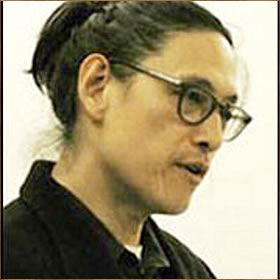
Li-Young Lee (Jakarta, 19 augustus 1957)
De Vlaamse dichter Frederik Lucien De Laere werd geboren in Brugge op 19 augustus 1971. Zie ook alle tags voor Frederik Lucien De Laere op dit blog.
Het verbond
Getraind als het geheugen is, het netwerk
Is de getrackte flashback, de herschikking van
Jeugdbelevenissen, het kader waarin het karakter
Zo goed als gevormd werd, en gelijk één
Uit de duizend de blueprint
Laat zien aan het publiek
Tien geboden op het lijf geschreven
Net als een tattoo die kenmerkt, net als
Ieder die het brandmerk draagt
En slaafsheid boven heerlijkheid verkiest
Tot elke prijs de vrijheid wegspoelt
Door de riolen van het staatsbestel
Onder het bevel van hogere machten
Die van deze wereld niet zijn
En vanuit glazen burelen
Nu de massa bespelen.
Oester
Onder haar tong had zij een kleine parel:
een juweel in de weelde van haar speeksel.
Dit blinkend geheim lag allang
te branden op haar lippen.
Toch sprak zij niet,
en moest ik met mijn zachte tang
zoeken naar haar waarde.
In haar stilte bleef zij zeldzaam.
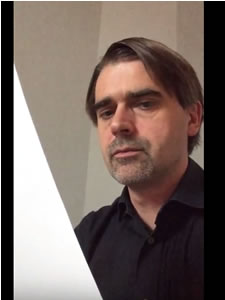
Frederik Lucien De Laere (Brugge, 19 augustus 1971)
De Nederlandse schrijver, dichter en vertaler Louis Th. Lehmann werd geboren op 19 augustus 1920 in Rotterdam. Zie ook alle tags voor Louis Th. Lehmann op dit blog.
Het Zwarte Schaap
Het zwarte schaap staat in de sneeuw,
het staat er langer dan een eeuw
en als een tentzeil hangt de grond
om zijn vier poten in het rond.
Het zwart schaap is iets dat weet
en elke hoef is een magneet
voor ’t voetstuk dat onzichtbaar is.
In bei zijn ogen zwemt een vis.
Des nachts kijkt niemand uit het raam,
want wie weet waar het dan kan staan
en als het ooit wordt weggebracht,
laat het een vuurspoor in de nacht.
Het zwarte schaap staat in de sneeuw,
het staat er langer dan een eeuw.
Amazone
Het steile jukbeen driest geslagen
in ’t duister van uw harenwal,
uw schouders recht en fier als schragen,
torpedostreng der heupen val,
die heel uw warmte, ingesloten
als in een schoorsteen, langs mij draagt.
Wie is ’t, die naar uw sterke schoot en
bescheiden borst te dingen waagt?
Uw warme blik zal niet verstalen,
wanneer gij voor uw huisdeur staat,
mijn ogen in de uwe dwalen,
gij mij uw hand omklemmen laat.
De glimlach om uw mond een vage
verduist’ring van het wangenbruin,
weet gij dat ik u iets kom vragen
van heel uw goed en sterk fortuin.
Gij staat als kon de beet van nacht
en afgrond u geheel niet deren,
die mij dreigt uit mijn diepste schacht.
Ik zal u voortaan fel ontberen.
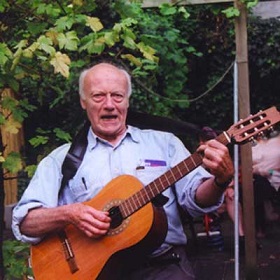
Louis Th. Lehmann (19 augustus 1920 – 23 december 2012)
De Amerikaanse dichter Frederic Ogden Nash werd geboren in Rye, New York, op 19 augustus 1902. Zie ook alle tags voor Ogden Nash op dit blog.
Always Marry An April Girl
Praise the spells and bless the charms,
I found April in my arms.
April golden, April cloudy,
Gracious, cruel, tender, rowdy;
April soft in flowered languor,
April cold with sudden anger,
Ever changing, ever true —
I love April, I love you.
The Centipede
I objurgate the centipede,
A bug we do not really need.
At sleepy-time he beats a path
Straight to the bedroom or the bath.
You always wallop where he’s not,
Or, if he is, he makes a spot.
The Cuckoo
Cuckoos lead Bohemian lives,
They fail as husbands and as wives,
Therefore they cynically disparage
Everybody else’s marriage.
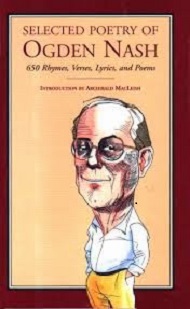
Ogden Nash (19 augustus 1902 – 19 mei 1971)
Cover
De Iers-Amerikaanse schrijver Frank McCourt werd geboren op 19 augustus 1930 in New York. Zie ook mijn blog van 19 augustus 2010 en eveneens alle tags voor Frank McCourt op dit blog.
Uit: Tis
“I’d see people at Mass on Sunday morning where a whisper would run through the church when someone with a hunger weakness would collapse in the pew and have to be carried outside by men from the back of the church who’d tell everyone, Stand back, stand back, for the lovea Jaysus, can’t you see she’s gasping for the air, and I wanted to be a man like that telling people stand back because that gave you the right to stay outside till the Mass was over and you could go off to the pub which is why you were standing in the back with all the other men in the first place. Men who didn’t drink always knelt right up there by the altar to show how good they were and how they didn’t care if the pubs stayed closed till Doomsday. They knew the responses to the Mass better than anyone and they’d be blessing themselves and standing and kneeling and sighing over their prayers as if they felt the pain of Our Lord more than the rest of the congregation. Some had given up the pint entirely and they were the worst, always preaching the evil of the pint and looking down on the ones still in the grip as if they were on the right track to heaven. They acted as if God Himself would turn His back on a man drinking the pint when everyone knew you’d rarely hear a priest up in the pulpit denounce the pint or the men who drank it. Men with the thirst stayed in the back ready to streak out the door the minute the priest said, Ite, missa est, Go, you are dismissed. They stayed in the back because their mouths were dry and they felt too humble to be up there with the sober ones. I stayed near the door so that I could hear the men whispering about the slow Mass. They went to Mass because it’s a mortal sin if you don’t though you’d wonder if it wasn’t a worse sin to be joking to the man next to you that if this priest didn’t hurry up you’d expire of the thirst on the spot. If Father White came out to give the sermon they’d shuffle and groan over his sermons, the slowest in the world, with him rolling his eyes to heaven and declaring we were all doomed unless we mended our ways and devoted ourselves to the Virgin Mary entirely. My Uncle Pa Keating would have the men laughing behind their hands with his, I would devote myself to the Virgin Mary if she handed me a lovely creamy black pint of porter. I wanted to be there with my Uncle Pa Keating all grown up with long trousers and stand with the men in the back with the great thirst and laugh behind my hand.”
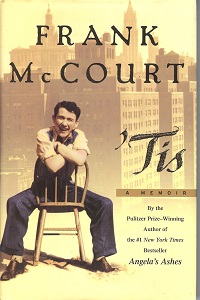
Frank McCourt (19 augustus 1930 – 19 juli 2009)
Cover
De Engelse toneelschrijver, dichter en criticus John Dryden werd geboren op 19 augustus 1631 in Aldwinkle (Northamptonshire). Zie ook mijn blog van 19 augustus 2010 en eveneens alle tags voor John Dryden op dit blog.
You Charm’D Me Not With That Fair Face
You charm’d me not with that fair face
Though it was all divine:
To be another’s is the grace,
That makes me wish you mine.
The Gods and Fortune take their part
Who like young monarchs fight;
And boldly dare invade that heart
Which is another’s right.
First mad with hope we undertake
To pull up every bar;
But once possess’d, we faintly make
A dull defensive war.
Now every friend is turn’d a foe
In hope to get our store:
And passion makes us cowards grow,
Which made us brave before.
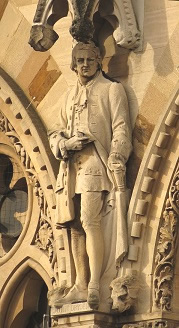
John Dryden (19 augustus 1631 – 12 mei 1700)
Standbeeld aan de Northampton Guildhall
Zie voor nog meer schrijvers van de 19e augustus ook mijn blog van 19 augustus 2011 deel 2 en ook mijn blog van 19 augustus 2010.
